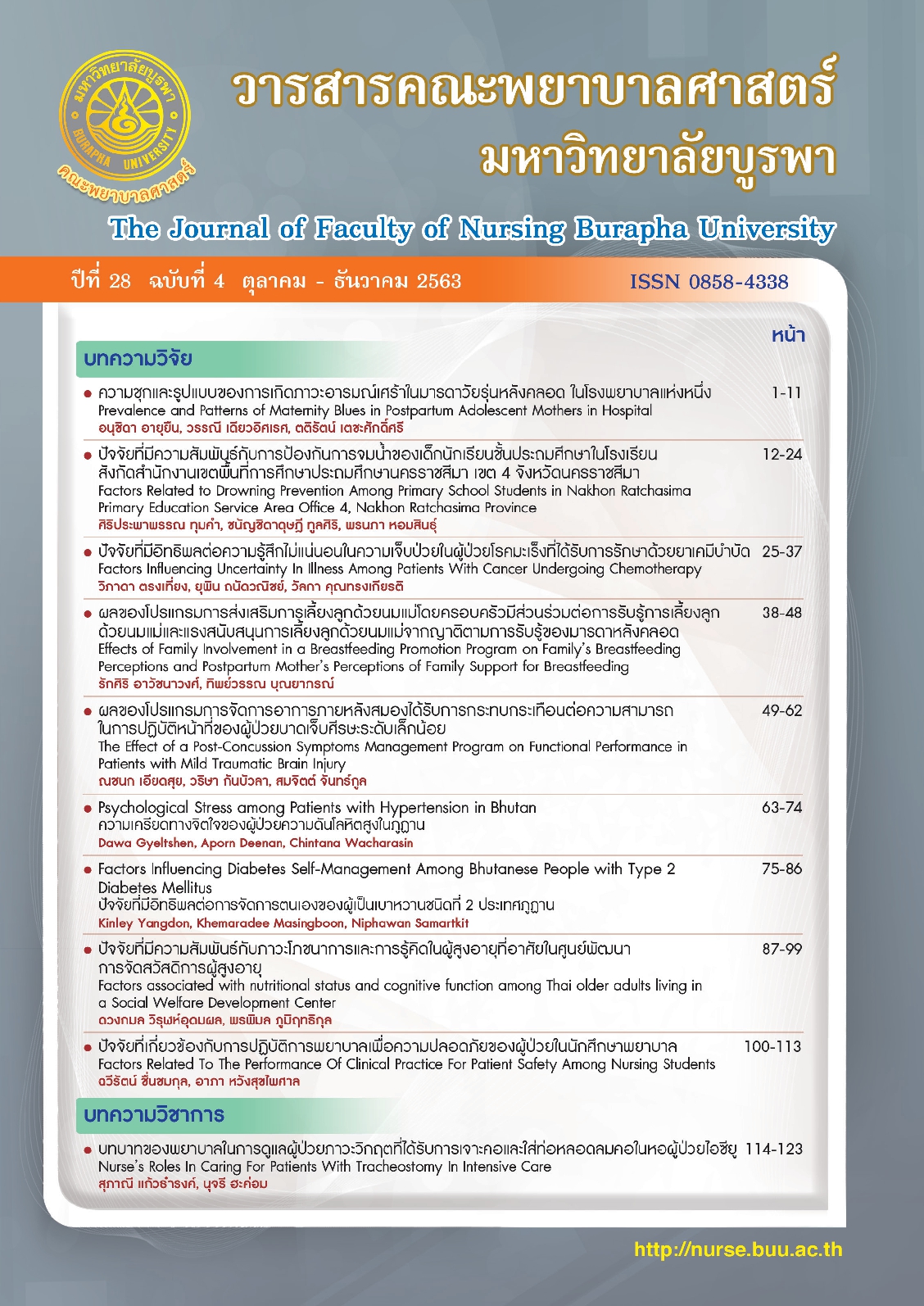ผลของโปรแกรมการจัดการอาการภายหลังสมองได้รับการกระทบกระเทือน ต่อความสามารถในการปฏิบัติหน้าที่ของผู้ป่วยบาดเจ็บศีรษะระดับเล็กน้อย
คำสำคัญ:
โปรแกรมการจัดการอาการ, สมองได้รับการกระทบกระเทือน, ความสามารถในการปฏิบัติหน้าที่, การบาดเจ็บศีรษะระดับเล็กน้อยบทคัดย่อ
บทคัดย่อ
การวิจัยครั้งนี้เป็นการวิจัยกึ่งทดลอง มีวัตถุประสงค์เพื่อศึกษาผลของโปรแกรมการจัดการอาการภายหลังสมองได้รับการกระทบกระเทือนต่อความสามารถในการปฏิบัติหน้าที่ของผู้ป่วยบาดเจ็บศีรษะระดับเล็กน้อย กลุ่มตัวอย่างเป็นผู้ป่วยบาดเจ็บศีรษะระดับเล็กน้อย แบ่งเป็นกลุ่มควบคุมและกลุ่มทดลอง จำนวนกลุ่มละ 36 คน โดยให้มีลักษณะคล้ายคลึงกันในด้านเพศ อายุ และระดับการศึกษา กลุ่มควบคุมได้รับการพยาบาลตามปกติ ส่วนกลุ่มทดลองได้รับโปรแกรมการจัดการอาการภายหลังสมองได้รับการกระทบกระเทือน เครื่องมือที่ใช้ในการเก็บรวบรวมข้อมูล ประกอบด้วย แบบบันทึกข้อมูลทั่วไป และแบบสัมภาษณ์ติดตามความสามารถในการปฏิบัติหน้าที่ วิเคราะห์ข้อมูลด้วยสถิติพรรณนา สถิติทดสอบค่าที และสถิติวิเคราะห์ความแปรปรวนแบบวัดซ้ำ
ผลการวิจัยพบว่า กลุ่มทดลองมีความสามารถในการปฏิบัติหน้าที่หลังจากได้รับโปรแกรมการจัดการอาการฯ ในวันที่ 7 และวันที่ 14 สูงกว่าก่อนทดลองและสูงกว่ากลุ่มควบคุมอย่างมีนัยสำคัญทางสถิติที่ระดับ .05 ผลการวิจัยครั้งนี้แสดงให้เห็นว่า โปรแกรมการจัดการอาการภายหลังสมองได้รับการกระทบกระเทือนสามารถช่วยให้ผู้ป่วยบาดเจ็บศีรษะระดับเล็กน้อยมีความสามารถในการปฏิบัติหน้าที่ได้ พยาบาลสามารถนำโปรแกรมนี้ไปประยุกต์ใช้เพื่อช่วยส่งเสริมความสามารถในการปฏิบัติหน้าที่ของผู้ป่วยบาดเจ็บศีรษะระดับเล็กน้อยหลังจำหน่ายออกจากโรงพยาบาล
เอกสารอ้างอิง
van der Naalt, J. (2018). Early predictors for long-term functional outcome after mild traumatic brain injury in frail elderly patients. Journal of Head Trauma Rehabilitation, 33(6), 1-9.
Andelic, N., Howe, E. I., Hellstrøm, T., Sanchez, M. F., Lu, J., Løvstad, M., & Røe, C. (2018).
Disability and quality of life 20 years after traumatic brain injury. Brain and behavior, 8(7), 1-10.
Bussell, C. A., & Gavett, B. E. (2019). Effects of media sensationalization on cognitive performance and post concussive symptoms. Journal of the International Neuropsychological Society: JINS, 25(1), 90–100.
Crawford, S., Wenden, F. J., & Wade, D. T. (1996). The rivermead head injury follow up questionnaire: a study of a new rating scale and other measures to evaluation outcome after head injury. Journal of Neurology, Neurosurgery, and Psychiatry, 60, 510-514.
Christopher, E., Alsaffarini, K. W., & Jamjoom, A. A. (2019). Mobile health for traumatic brain injury: a systematic review of the literature and mobile application market. Cureus, 11(7), 1-18.
Dams-O'Connor, K., Sy, K., Landau, A., Bodien, Y., Dikmen, S., Felix, E. R., … Whiteneck, G. (2018). The feasibility of telephone-administered cognitive testing in individuals 1 and 2 years after inpatient rehabilitation for traumatic brain injury. Journal of neurotrauma, 35(10), 1138–1145.
Deethongkham, D. (2015). Relationship between post concussion symptoms and functional performance in patients with mild traumatic brain injury. In Proceedings The 5th national and international graduate study conference. (pp. 3093-3107) Bangkok: Silpakorn university. [In Thai]
Dexheimer, J. W., Kurowski, B. G., Anders, S. H., McClanahan, N., Wade, S. L., & Babcock, L. (2017). Usability evaluation of the SMART application for youth with mTBI. International Journal of Medical Informatics, 97, 163-170.
Dodd, M., Janson, S., Facione, N., Faucett, J., Froelicher, E. S., Humphreys, J., … Taylor, D. (2001). Advancing the science of symptom management. Journal of advanced nursing, 33(5), 668–676.
Ettenhofer, M. L., Guise, B., Brandler, B., Bittner, K., Gimbel, S. I., Cordero, E., … Chan, L. (2019). Neurocognitive driving rehabilitation in virtual environments (NeuroDRIVE): a pilot clinical trial for chronic traumatic brain injury. NeuroRehabilitation, 44(4), 531–544.
Hamzah, N., Narayanan, V., Ramli, N., Mustapha, N. A., Mohammad Tahir, N. A., Tan, L. K., … Mazlan, M. (2019). Randomised controlled clinical trial of a structured cognitive rehabilitation in patients with attention deficit following mild traumatic brain injury: study protocol. BMJ open, 9(9), 1-11.
Hickey, J. V. (2014). The clinical practice of neurological and neurosurgical nursing. (7thed). Philadelphia: Lippincott Williams & Wilkins.
Isaacs, B., & Akhtar, A. J. (1972). The set test: a rapid test of mental function in old people. Age and ageing, 1(4), 222–226.
Lum, P., Harnirattisai, T., & Tantongtip, D. (2019). The effects of a continuing care program on the perceived self-efficacy of caregivers and post-concussion syndrome in persons with mild traumatic brain injury. Rama Nurs J, 25(1), 58-73. [In Thai]
National Center for Injury Prevention and Control. (2015). Report to congress on traumatic brain injury in the united states: epidemiology and rehabilitation 2015. Retrieved from: https://www.cdc.gov/traumaticbraininjury/pdf/tbi_report_to_congress_epi_and_rehab-a.pdf
Nelson, L. D., Furger, R. E., Ranson, J., Tarima, S., Hammeke, T. A., & Randolph, C. (2018). Acute clinical predictors of symptom recovery in emergency department patients with uncomplicated mild traumatic brain injury or non-traumatic brain injuries. Journal of Neurotrauma, 35(2), 249-259.
Pacella, M., Prabhu, A., Morley, J., Huang, S., & Suffoletto, B. (2018). Postconcussive symptoms over the first 14 days after mild traumatic brain injury: an experience sampling study. Journal of Head Trauma Rehabilitation, 33(3), 31-39.
Ponjaras, S., Hirunchunha, S., & Phonphet, J. (2018). Headache and dizziness, symptom management, and quality of life of patients with mild traumatic brain injury. Songklanagarind Journal of Nursing, 38(3), 65-78. [In Thai]
Ponsford, J., Nguyen, S., Downing, M., Bosch, M., McKenzie, J. E., Turner, S., … Green, S. (2019). Factors associated with persistent post-concussion symptoms following mild traumatic brain injury in adults. Journal of Rehabilitation Medicine, 51(1), 32-39.
Tator, C. H., Davis, H. S., Dufort, P. A., Tartaglia, M. C., Davis, K. D., Ebraheem, A., & Hiploylee, C. (2016). Postconcussion syndrome: demographics and predictors in 221 patients. Journal of neurosurgery, 125(5), 1206–1216.
Thaweekhoon, R., & Pearkao, C. (2019). Effects of a smartphone application on knowledge discharge outcome among patients with mild traumatic brain injury. Journal of The Royal Thai Army Nurses, 20(2), 272-279. [In Thai]
The Royal College of Neurological Surgeons of Thailand. (2013). Clinical practice guidelines for traumatic brain injury. Retrieved from: https://www.rcnst.or.th/files/filedoc/2019-05-18/knowledge_2019-05-18-21-20-08_48.pdf [In Thai]
Van der Naalt, J., Timmerman, M. E., de Koning, M. E., van der Horn, H. J., Scheenen, M. E., Jacobs, B., … Spikman, J. M. (2017). Early predictors of outcome after mild traumatic brain injury (UPFRONT): an observational cohort study. The Lancet Neurology, 16(7), 532–540.
Vas, A., Chapman, S., Aslan, S., Spence, J., Keebler, M., Rodriguez-Larrain, G., … Krawczyk, D. (2016). Reasoning training in veteran and civilian traumatic brain injury with persistent mild impairment. Neuropsychological rehabilitation, 26(4), 502–531.
Wannasrithong, A., Samartkit, N., & Masingboon, K. (2016). Relationships between headache, fatigue, sleep disturbance, and performance in mild head injury patients. Journal of Nursing and Health Care, 34(2), 152-163. [In Thai]
Wheeler, S., Acord-Vira, A., & Davis, D. (2016). Effectiveness of interventions to improve occupational performance for people with psychosocial, behavioral, and emotional impairments after brain injury: a systematic review. The American journal of occupational therapy: official publication of the American Occupational Therapy Association, 70(3), 1-9.





